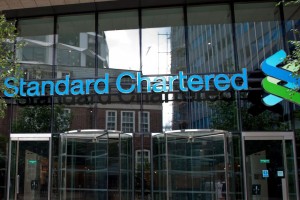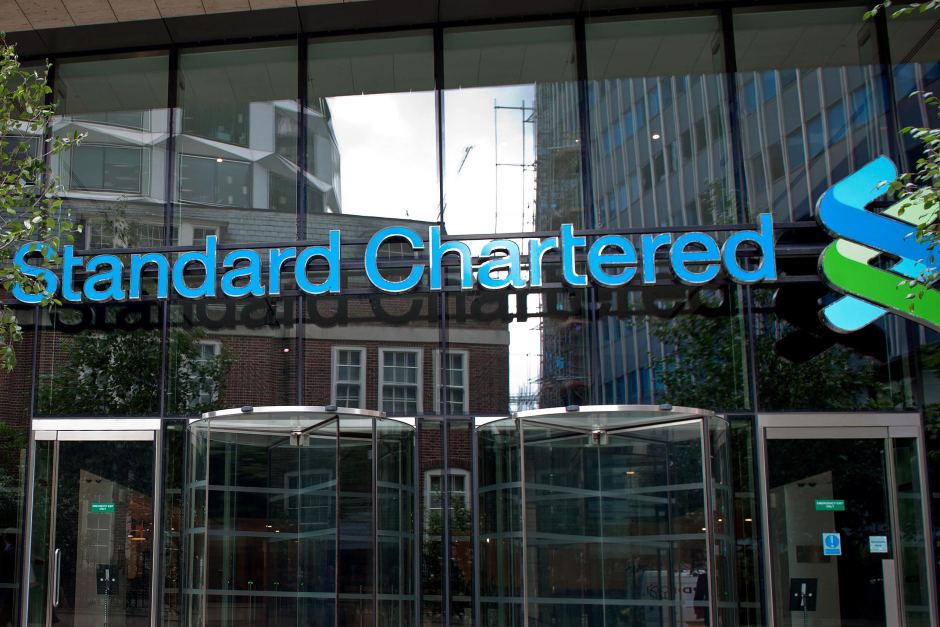
(AFP Photo/Will Oliver)
By: Nasser Yousef
Despite their recent withdrawal from a merger with Piraeus, UK based Standard Chartered recently stated that it still considered Egypt an attractive market for business and investment.
Standard Chartered previously announced in 2011 that it wanted to merge with the Greek bank Piraeus once Egypt’s Central Bank completed its due diligence, however at the end of the year Standard Chartered announced they had decided to withdraw from the deal.
The failed merger was Standard Chartered’s third, as they had made several prior attempts to enter the Egyptian market by way of purchasing local banks. The first attempt came 11 years ago when it sought to purchase the Egyptian American bank, in addition to the Banque du Caire in 2008.
Standard Chartered’s desire to enter the Egyptian market reflects a large shift in the bank’s strategic policy to pursue developing markets. Indeed in 2001 bank representatives stated that they would not seek to do business in the Middle East due to the “vague state of affairs” in the region, the same reason the bank gave for withdrawing from its deal to purchase EAB in 2002.
Officials have noted that the bank’s policy regarding the Egyptian market changed substantially since the outbreak of the 25 January Revolution, with representatives seeking to merge with Piraeus but backing out later on.
The repeated instances of Standard Chartered failing to enter onto the Egyptian market have had negative effects on the country’s economy. Egypt had first been looking forward to Standard Chartered’s purchase of EAB in 2008, seeing as such a merger would have injected large sums of hard currency into the economy at a time when the country was facing challenges related to currency devaluation. The bank’s decision to then back out of its deal to purchase Piraeus, as a result, and according to Standard Chartered, of clashes occurring at Egypt’s presidential palace, had a negative effect on Egypt’s reputation amongst foreign investors, who hoped the deal would signal the beginning of a new era of foreign investment in Egypt.
The bank stated at the beginning of the year that it sought to work with Egypt throughout 2013 to help the country avoid economic collapse, setting goals of achieving a 3% growth rate. Three months later, Kristen Papadopoulos, chief executive of the Bank’s Middle East, North Africa and Pakistan branch, confirmed recently that the bank officially sought to enter into Egypt’s market.
Bank officials stated that they viewed Egypt as currently going through a transitional phase which would eventually lead to political and economic stability, a fact which would help the country attract higher levels of investment in the long term.
They further went on to say that at the moment there did not exist any Egyptian banks that Standard Chartered sought to merge with, adding however that they would seize the opportunity to do so if it presented itself.
Officials from the bank stated however that they were awaiting announcements from Credit Agricole and Intesa Sanpaolo clarifying as to whether or not the two would still seek to put their Egyptian branches up for sale. Officials from the two banks however recently repudiated these claims, saying that they intended to remain involved in the Egyptian market.
Reports have surfaced that there still exists potential for Standard Chartered to enter onto the Egyptian market by merging with either the United Bank or Arab African International bank.
According to Mohamed Ashmawi, president of the board of directors for United Bank, owned by Egypt’s Central Bank, said that his bank would make its way onto Egypt’s stock exchange in three stages, on the condition that profits of no less than 5% are achieved. The Egyptian Financial Supervisory Authority stated that initial IPO offerings would make available 30% of company stock, second IPO offerings making available an additional 30%, with the remaining 40% being offered in a third round.



